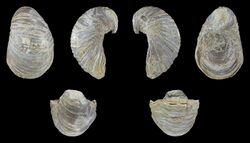Biology:Gryphaea
| Gryphaea | |
|---|---|

| |
| Gryphaea arcuata | |
| Scientific classification | |
| Domain: | Eukaryota |
| Kingdom: | Animalia |
| Phylum: | Mollusca |
| Class: | Bivalvia |
| Order: | Ostreida |
| Family: | Gryphaeidae |
| Genus: | †Gryphaea Lamarck, 1801 |
Gryphaea, one of the genera known as devil's toenails, is a genus of extinct oysters, marine bivalve mollusks in the family Gryphaeidae.
These fossils range from the Triassic period to the middle Paleogene period[citation needed], but are mostly restricted to the Triassic and Jurassic. They are particularly common in many parts of Britain.
These oysters lived on the sea bed in shallow waters, possibly in large colonies. The complete fossils consist of two articulated valves: a larger gnarly-shaped shell (the "toenail") and a smaller, flattened shell, the "lid". The soft parts of the animal occupied the cavity between the two shells, just like modern oysters. The shells also feature prominent growth bands. The larger, curved shell sat within the mud on the sea floor. These shells are sometimes found in fossil plates along with Turritella, clams, and sometimes sharks' teeth and fossilized fish scales. Its distribution is common in areas of Europe.
A classic location to find these fossils is Redcar, on the northeast coast of England. There used to be a common folk belief that carrying one of these fossils could prevent rheumatism.
The name "devil's toenail" is also used for some fossil species of the genus Exogyra, which is in the same family (Gryphaeidae) as Gryphaea.
Two genera have been removed from this genus: Pycnodonte and Texigryphaea.
Selected species
References
External links
Wikidata ☰ Q129290 entry
 |

